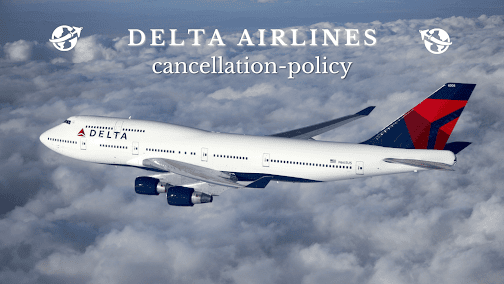Delta Flight Cancellation Policy: A hassle-free cancellation
Understanding Delta's Cancellation Fees
Travelers need to understand Delta's cancellation fees. With a rise in flight cancellations
due to the COVID-19 outbreak, understanding the costs imposed by airlines such
as Delta might assist in making informed decisions. Delta's cancellation fees
vary depending on criteria such as fare type and timing of cancellation.
Travelers can balance the costs and benefits of cancelling or changing their
reservations by understanding these fees. It also illustrates Delta's
flexibility and customer-focused approach, particularly in uncertain times.
Knowing about temporary policy changes can help you take advantage of reduced
prices or longer travel credits. Finally, understanding Delta's cancellation
fees enables travellers to handle travel arrangements and reduce their
financial impact.
Delta Air Lines offers a detailed cancellation policy that
specifies the rules and fees for cancelling or changing flight bookings.
Understanding Delta's cancellation policy is critical for travellers to
efficiently negotiate any changes to their trip plans.
Key Components of Delta's Cancellation Fees:
Fare Types: Delta offers both non-refundable and refundable fares.
Non-refundable fares are often less expensive initially but may have higher
cancellation fees. Refundable fares, on the other hand, offer greater
flexibility and, in many cases, have lower or no cancellation fees.
Timing of Cancellation: Delta's cancellation fees vary depending on when
the cancellation is made about the departure date. Generally, the higher the
cancellation price, the closer the cancellation is to the departure date.
Delta SkyMiles Members: SkyMiles, Delta's frequent flyer program, provides
members with additional perks. Members may be eligible for reduced or waived
cancellation costs depending on their membership level. SkyMiles members ought
to review their membership advantages as well as the specific restrictions
regarding cancellation costs
Exceptional Circumstances: Delta may have particular provisions for waiving or
reducing cancellation fees in certain unusual circumstances, such as a family
death or severe weather conditions. Passengers should check Delta's policy in
such cases and follow the appropriate processes for requesting waivers or
refunds.
Temporary Policy Changes: In extreme cases, such as the COVID-19 pandemic,
airlines may make temporary changes to their cancellation policy to satisfy
passengers' requirements. Fees may be waived, flexible travel credits offered,
or the validity of existing tickets extended.
Understanding Fare Types and Cancellation Fees
How Fare Types Affect Cancellation Fees
Fare types play a crucial role in determining the
cancellation fees imposed by Delta Air Lines. Here's how different fare types can
affect these fees:
Non-Refundable Fares: Non-refundable fares have lower initial prices but higher
cancellation fees. If you need to cancel a non-refundable ticket, the
cancellation cost will be deducted from any refund you get. These fees can vary
depending on criteria such as fare class, route, and cancellation timing. When
booking a non-refundable fare, it is critical to carefully analyse the
potential cancellation fees and assess the chance of needing to change your
trip plans.
Refundable Fares: Refundable fares provide greater flexibility and frequently
have cheaper or no cancellation costs. If you need to cancel a refundable
ticket, depending on the fare conditions, you may be eligible for a full or
partial refund. While refundable flights are often more expensive, they provide
peace of mind by enabling more flexibility to make changes or cancel
without paying significant fines.
Exploring Different Fare Types Offered by Delta
Delta Air Lines provides a wide range of fare categories to
meet the demands of different kinds of travellers. Some common fare types
include:
Main Cabin: Delta's Main Cabin fares are normally non-refundable and
subject to restricted rules and regulations. These prices are frequently the
most cost-effective alternative for travellers and provide a basic level of
service.
Delta Comfort+ and Delta One: Delta Comfort+ and Delta One are
premium cabin pricing alternatives. In general, these fares offer greater
amenities, comfort, and flexibility than Main Cabin fares. Cancellation fees
for these premium cabin prices may differ from those for Main Cabin fares,
depending on the fare restrictions.
Basic Economy: Basic Economy fares are designed for travellers seeking
the lowest available fares. However, these fares frequently come with
additional restrictions, such as restricted or no changes or cancellations.
Before making a reservation, it is crucial to carefully research the fare
conditions connected with Basic Economy fares and understand the potential
impact on cancellation fees.
Circumstances Where Delta May Waive Cancellation Fees
Death or Serious Illness: Waivers may be considered if you or a close family
member is seriously ill or passes away. It is possible that documentation, such
as a death certificate or medical records, will be sought.
Military Orders: Active-duty military members who face an unexpected
deployment or order change may be eligible for waivers. Proper military
documentation is necessary.
Weather Disruptions or Natural Disasters: Waivers may be offered in the event
of severe weather or natural disasters that cause major flight interruptions.
These are typically announced during such incidents and apply just to the
affected regions.
COVID-19 Pandemic: Delta, like other airlines, developed temporary rules to
accommodate changing limitations during the pandemic. Fee waivers, flexible
travel credits, and extended ticket validity were common features of these
plans. Keep up to current on Delta's COVID-19 policy.
Travel Insurance and Cancellation Fees
The Role of Travel Insurance in Cancellation Fees
Travel insurance can play a crucial role in protecting travellers
from potential financial losses associated with cancellation fees. Here's how
travel insurance relates to cancellation fees:
Reimbursement for Non-Refundable Expenses: Travel insurance can cover
non-refundable expenses such as cancellation fees. If you need to cancel your
trip due to covered causes stated in the policy, such as illness, injury, or
unanticipated circumstances, travel insurance can compensate you for
cancellation fees.
Trip Interruption Coverage: Travel insurance can cover trip interruptions in
addition to cancellation fees. If you have to cancel your trip because of a
covered reason, such as a medical emergency or natural disaster, travel
insurance can reimburse you for the unused portion of your vacation, including
any prepaid charges and cancellation penalties.
Pre-Existing Medical Conditions: Pre-existing medical conditions are
covered by some travel insurance policies. If you have a pre-existing condition
that worsens unexpectedly and forces you to cancel the trip, your travel
insurance can pay the associated cancellation expenses.
Coverage Options and Benefits of Travel Insurance
When considering travel insurance, it is important to
review the coverage options and advantages provided by various policies.
Here are some common cancellation fees coverage options and benefits:
Trip Cancellation Coverage: This coverage reimburses you for non-refundable
charges, such as cancellation fees, if you need to cancel your trip for one of
the policy's covered reasons.
Trip Interruption Coverage: This coverage reimburses you for unused portions of
your trip as well as any additional expenses paid if you have to return home
early due to covered reasons.
Cancel for Any Reason (CFAR) Coverage: CFAR coverage allows you to cancel
your trip for any reason, even if it is not stated as a covered reason in the
policy. This coverage often reimburses a percentage of your non-refundable,
prepaid charges, including cancellation fees.
Pre-Existing Medical Conditions Coverage: Some travel insurance packages
cover pre-existing medical conditions. If your condition worsens unexpectedly
before your vacation, this coverage may pay cancellation fees.
Policy-specific Exclusions: It is important to carefully analyse the
policy exclusions to understand what is and is not covered. Certain cases may
be restricted from coverage, including pre-existing conditions that do not fulfil particular
criteria or cancellations for personal reasons.
Conclusion
Understanding Delta's cancellation costs enables travellers
to make informed decisions and successfully manage their travel plans. Travelers
who are aware of the fees may consider the financial impact of cancelling or
changing their reservations and select the best fare option. It also enables travellers
to investigate cost waivers or exceptions in rare instances, as well as the
advantages of obtaining travel insurance for further safety.
Keep in mind to research Delta's specific policies, remain up
to date on any temporary adjustments or waivers, and follow proper procedures
when requesting a waiver. When considering fare kinds and determining whether
to acquire travel insurance, travellers should assess their specific demands,
flexibility requirements, and potential dangers.
Travelers can manage their travel plans more efficiently
and minimize any financial consequences that may occur from changes or
cancellations to their flights by taking all of this into account and
understanding Delta cancellation fees. For any query, please log in at the
Support Airlines website or can directly get a Delta assisted at +1-332-699-4898.



Comments
Post a Comment